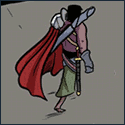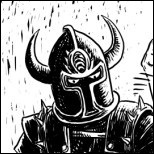|
ijyt posted:Yeah, it was especially annoying on the easy skill checks where I assumed it wouldn't be a problem. Lesson learned. Same here, for things I expected they'd easily pass or for really trivial checks it was a chore to drum up a neat side effect. On that note, my current party is an Assassin, a Doctor+Scholar, a Pilot, and an Entrepreneur... coming up with adventures that interest all of them so far has been kind of difficult.
|
|
|
|

|
| # ? May 12, 2024 00:59 |
|
Zodack posted:Same here, for things I expected they'd easily pass or for really trivial checks it was a chore to drum up a neat side effect. If it's trivial, either don't make them roll, or borrow a page from Powered By The Apocalypse games and make the bad things hints at upcoming badness that might not be related to the current task (noises of nearby trouble, a ship on the horizon, a battery starting to head towards zero). Edit: Sorry, misread this as succeed with disadvantage, not fail with advantage. UrbanLabyrinth fucked around with this message at 23:43 on Feb 14, 2016 |
|
|
|
I meant "trivial" more along the lines of "the success or failure of the roll needs to be known, but the outcome of the roll in the grand scheme of the rest of the adventure is less important". I'm not making them roll Piloting checks to land or Perception checks to see things that are visible, for instance, but when they ask me if they can roll what equates to Intimidating a few of the local law enforcement (who are more or less wet noodles) and I make the check Easy and they still fail it with advantage, it's hard to come up with something unrelated but good that also happens while the targets of their check react to it as a failure. I could drum up a few things on the spot but they never really felt adequate to me.
|
|
|
|
They couldn't intimidate then, but they didn't get arrested and maybe law enforcement is amenable to a bribe. The bribe is lower/possible because of the Advantage. Or just make it a simple mechanical Boost die to the next roll anyone makes towards the cops. If it's not a trivial situation, or you want it to become non-trivial, you could also make the bribe a task. Quid pro quo. And then they're off an adventure to keep them busy for awhile. DemonMage fucked around with this message at 00:42 on Feb 15, 2016 |
|
|
|
I second DemonMage. Not getting arrested is a good thing. And since this is the outer rim (correct?), bribes are totally setting appropriate.
|
|
|
|
Designing a boss fight for the group against a Wayfarer that has a Retrofitted Hangar Bay in place of its giant cargo container, which contains some annoying silhouette 3 snub fighters. It has extra armor, so its handling is mega bad, and it has a light turbolaser mounted on top. I named it the Hornet's Nest. We'll see how the encounter goes. If they can't beat it that works fine because they're (the Wayfarer crew) pirates/scavengers anyhow.
|
|
|
|
Maybe I'm reading the rules wrong but it seems fighters as pc ships are kind of death traps?
|
|
|
|
If you're a good pilot they aren't, and if your GM is merciful they aren't, but you've seen what happens to fighter craft in A New Hope any beyond when the shields go down. They just explode. I would say a great pilot would be able to wreak havoc in one (some of them are really heavily outfitted), but getting in a TIE seems like a really bad idea. So... yeah, they're a deathtrap. Low HT, sometimes no shields, sometimes no armor.
|
|
|
|
ShineDog posted:Maybe I'm reading the rules wrong but it seems fighters as pc ships are kind of death traps? Yeah in a game where its pretty easy to slam a couple of successive hits, its a nightmare to run with them. A big part of the reason I stopped using the Eote vehicle rules for space fights. Even in the X-wing you've got 10 health and 3 armour. Something 2-3 hits from a TIE fighter is going to be able to cut through. I would recommend just adding the character's health on top of the vehicle's health for personal vehicles (same for rivals and Nemesis though tailor as needed). Its enough so you can dogfight and repair your ship. Remember to have ships like the X-wing carry their Astromech so the pilot is getting a free tech specialist as a crewmember who is constantly repairing them.
|
|
|
|
kingcom posted:Yeah in a game where its pretty easy to slam a couple of successive hits, its a nightmare to run with them. A big part of the reason I stopped using the Eote vehicle rules for space fights.
|
|
|
|
Talkie Toaster posted:The fix I've wanted to try is 'shields convert damage to System Strain (1 point per, pre armour)'. It makes shields more reliable and players way more likely to end up over strain and drifting rather than dead. Well, the GM is in full control of how any space combat works. The book has a caveat that the GM can definitely say the ship crashes instead, or it busted but not going to explode. Granted, moving at dogfight speeds and suddenly having your engines stop working is its own danger, but at least you didn't combust, right?
|
|
|
|
ShineDog posted:Maybe I'm reading the rules wrong but it seems fighters as pc ships are kind of death traps? You're supposed to let your PCs eject in most cases, only if you get over like 190 on the crit table does the ship porkins without any way of survival. The ship should be wholly disabled well before that. Then you just have the battle wreckage gone over by some opportunistic bounty hunters and BAM, rescuing your captured party member is your next quest.
|
|
|
|
How do you guys handle dialogue in a tense situation in which combat might break out any second without letting the players in on the fact that the NPCs might not attack them? For example, I had the ISB show up and interrogate my party. I had them roll Initiative at the start of that encounter, and then the NPCs and PCs were able to talk and still maintain an initiative order. This worked because the NPC won the top slot, and was able to show them he wasn't immediately going to shoot. However, I feel saying "roll for Initiative" often gives players the wrong impression and just flips the killswitch. An encounter done in this way might melt down into a petty firefight over a perceived threat that might have been talked out. So, their loss, or GM's poor planning? Is there a better way to handle this? I feel the primary alternative - which is simply not put them in an initiative order - either projects the opposite impression (the NPCs are not going to become hostile) or does not preserve a good sense of flow (if an NPC is offended or playing you, you "waste" your turn talking and then on their action they take a shot on you). Social Encounters do exist in EotE, which might be a good way to start off the encounter. Have them talk, and then if one or more of the PCs or NPCs want to go into combat, it doesn't give either group the impression that they need to just flip their kill switch and mow down mobs.
|
|
|
|
Zodack posted:How do you guys handle dialogue in a tense situation in which combat might break out any second without letting the players in on the fact that the NPCs might not attack them? I don't understand -- why don't you just roll for initiative when somebody decides to start shooting? The fact that you already talked before they drew their blaster doesn't mean they're going before you.
|
|
|
|
So you advocate giving the first person to shoot a priority slot for the first round of combat? The alternative is someone decides to shoot and then the PCs are telepathically alerted to the fact he might shoot. The ISB walking up to my party and me saying to my party "The agent walks up to you and draws his blaster. Roll for initiative" would result in my combat PCs immediately shooting him, regardless of the NPCs intention. Maybe a good way to handle that would be to throw setback dice on an initiative roll - but throwing that onto a Simple check feels dirty, and has lasting implications for the rest of the combat instead of simply the explosive start. As a GM, you can't just say "He is infuriated with what you just said, and seeing how he already has his blaster drawn and pointed at you, decides to shoot you. But roll for initiative because maybe you'll be able to take an entire maneuver and before that happens, because you're a PC and hearing 'roll for initiative' sends a telepathic message to your character that poo poo is about to go down". Similar situation to sniping someone. There's no explicit rule for "sneak attacks" or "attacks of opportunity". I've GM'd a scene before in a different setting where I had an NPC aiming a bow with a nocked arrow at someone and told them "Drop your weapons or I shoot", the PC proceeds to try to talk him down and then got pissy when I gave the archer a free attack. The alternative is, what, you get to try to talk him down, and then you might get an entire combat round even though your opponent has the upper hand? In the "initiative is rolled beforehand", you have a good understanding of when people will be able to act. I'm not sure what the right thing to do there was. I don't know. Maybe I'm just a lunatic. EotE handles this fairly interestingly with Cool and Vigilance, but I already have players complaining that they have to train two skills to "always go first". Zodack fucked around with this message at 05:56 on Feb 16, 2016 |
|
|
|
Zodack posted:The alternative is someone decides to shoot and then the PCs are telepathically alerted to the fact he might shoot. Rent The Good, The Bad and The Ugly. During the final showdown scene, watch how Clint Eastwood keeps his cool. Telepathy has nothing to do with it. As an added bonus: Beyond the archetypical faster reflexes, this scene also shows the benefits of pre-planning. nelson fucked around with this message at 06:58 on Feb 16, 2016 |
|
|
|
nelson posted:Haven't you ever watched a Western movie? The first guy going for his gun isn't always the first to get a shot off. Just because someone initiates combat doesn't mean others can't react faster... at least not if they keep their cool and have expectations that something may happen (but not necessarily will happen). Your example is the easy Cool vs. Cool check from the book. I've seen the movie. It's three people who all know that they're about to shoot, something is about to go down. It's people eyeing each other, hands near their guns, saying nothing (The other issue with Cool is "faster reflexes" somehow translates to Presence?). I am talking situations in where you don't know and there is reasonable doubt. An officer or Stormtrooper walks up with a weapon drawn, a man is pointing a concealed weapon at you from under the table you can't see, there's an Imperial sniper five to six kilometers out with a bead on your - or a friendly NPC's - head. (E: on 108 in the book for Cool it talks about situations like these, but it just doesn't feel right) So if I have a sniper at extreme range about to shoot a PC (not something I would do, but it's an example) and I tell the PC "roll for initiative"? They somehow get the opportunity to go first? I can see the rationalization of telling the PCs "you see a glint in the far distance - roll for Initiative" to alert them to something being wrong but my gut tells me that's a Perception check. I had a PC want to shoot an NPC in the back, the NPC was totally unaware, but got to act first in the combat because of how initiative worked. It was a Cool (PC) vs. Vigilance (NPC) check, but it still didn't make thematic sense. He didn't know it was coming, there was nothing alerting him to the fact he was about to get shot, and yet there's no mechanic to represent that. Maybe I'm communicating this wrong. Neither I nor my PCs are satisfied with how to handle those situations. I've talked with them, and right now it makes the most sense to have the "advantage" attacker get in a free shot and then take his correct place in the initiative order in the second round of combat, presuming he isn't dead. Zodack fucked around with this message at 07:17 on Feb 16, 2016 |
|
|
|
Its sounds like what you are describing are Surprise Round actions, or narrative "getting the jump" on the party or NPCs. Usually as GM it is up to you to give the players an opportunity to make a skill check to see an attack coming and react in the initiative round, or make a skill check to conceal their intentions until the actual attack. Skills like cool, perception, vigilance can be used to react in the first round, or things like deception, skulduggery, and stealth can be used to catch NPCs off guard. It is a pretty normal trope in tabletop for there to be a surprise or reaction round at the start of initiative. As an example you used above, the players walk out of a cantina unknowingly into a sniper's killzone. Perception checks can catch the glint of sunlight off his scope, and characters that pass the perception check can act in the first round of initiative. Characters that fail the check have to wait a full round before they can take any reactions. If the PCs want to shoot an NPC in the back you can have them roll initiative as normal but allow them a surprise round of actions before the NPC knows whats happening, or have the players pass a deception or stealth check. A failed stealth check might mean the NPC saw the reflection of the gun being raised in a nearby shiny surface or something. Even something like a streetwise check might warn the PCs that trouble is brewing and let them react before they are jumped, or fail to react in time for the first round of actions. Beach fucked around with this message at 07:48 on Feb 16, 2016 |
|
|
|
Beach posted:If the PCs want to shoot an NPC in the back you can have them roll initiative as normal but allow them a surprise round of actions before the NPC knows whats happening, or have the players pass a deception or stealth check. A failed stealth check might mean the NPC saw the reflection of the gun being raised in a nearby shiny surface or something. Even something like a streetwise check might warn the PCs that trouble is brewing and let them react before they are jumped, or fail to react in time for the first round of actions. Right, this is what I was trying to advocate and see if it was a good idea. The idea of Stealth or Deception checks to mask their actions are also good suggestions. I was thinking of maybe letting players substitute Cunning for Presence on Cool if they did this and made a good argument. I think it might just be my players, but telling them to roll for Initiative makes them start shooting, regardless of who is involved, and it makes writing interesting or tricky scenarios a bit exasperating as the GM.
|
|
|
|
Zodack posted:I had a PC want to shoot an NPC in the back, the NPC was totally unaware, but got to act first in the combat because of how initiative worked. It was a Cool (PC) vs. Vigilance (NPC) check, but it still didn't make thematic sense. He didn't know it was coming, there was nothing alerting him to the fact he was about to get shot, and yet there's no mechanic to represent that. How does that makes no thematic sense? The NPC won a vigilance check against a player trying to act, so there was something that alerted him. Maybe the PC's sharp intake of air as they drew gave them away, maybe a slightly too brutal gesture did, maybe a foot hit the ground harder than it should. The point is, the PC acted a bit too nervously not to be remarked.
|
|
|
|
I'm honestly a bit baffled why you would even bother to roll for initiative in this situation. If someone shoots with no way of the other side knowing its coming, have them shoot. THEN roll for initiative for the reactions. Some things happen that no one can stop, have them happen, then allow your players to react. lets set up a similar situation - your players are in a standoff with an imperial agent, who has Stormtroopers backing him up and a gun drawn and pointing at the players. You make any rolls for the conversation first, then if/when the NPC snaps (say on a despair rolled by a player) he shoots someone. Then, and only then, do you roll for initiative as all hell breaks lose in the room.
|
|
|
|
Iceclaw posted:How does that makes no thematic sense? The NPC won a vigilance check against a player trying to act, so there was something that alerted him. Maybe the PC's sharp intake of air as they drew gave them away, maybe a slightly too brutal gesture did, maybe a foot hit the ground harder than it should. The point is, the PC acted a bit too nervously not to be remarked. Conferring no bonuses to a player who is setting up a suckerpunch feels wrong. Nobody wins by leaving it up to that dice roll. I understand where you're coming from but there are other systems that handle this better, and neither I nor my players feel 100% satisfied with EotE's method. My PC could spend days planning meticulously how to assassinate this important figure, yet I have to leave it up to an unmodified dice roll? We'll have to agree to disagree. For the most part I agree that it works fluidly but there are some scenarios where it's not okay for me or my players. The reason I brought this up is, as you guys can tell, there are some pretty varying opinions on this.
|
|
|
|
So . . . the issue is that when you start combat by using the combat rules, your players start combat. I admit I am not fully understanding this, still. Sorry about that! What is wrong with: 1) if the players shoot first and the bad guys weren't expecting it, let them get a surprise round where they each get one action or maneuver (rather than action + maneuvers) 2) if both sides were reasonably "on guard", roll initiative when one side shoots 3) if the bad guys shoot first and the players weren't expecting it (and sometimes you'd let them make a check before to see something isn't right), the bad guys get their own single-action surprise round For these surprise rounds, you don't even have to let them roll initiative yet, giving players or enemies a chance to yell "surrender!" or "Don't shoot!", so even taking these sudden actions does not automatically become a fight to the death.
|
|
|
|
homullus posted:So . . . the issue is that when you start combat by using the combat rules, your players start combat. This is the issue. There is no explicit mechanic in the combat rules for a "surprise round". I did not want to house rule one without getting some other opinions - so this is what I was trying to communicate: "how do I handle [special case]"? Something beyond Cool vs. Cool, or Cool vs. Vigilance. The idea of a Surprise Round with either 1 Maneuver or 1 Action seems to be the best choice, as you have posted... but I can't "star the combat using the combat rules" when, in fact, there isn't a proper rule for surprise attacks. So, yes, 2 is what I normally do, and 1 and 3 are what I'm proposing be done in special cases and trying to garner an opinion for. Zodack fucked around with this message at 15:48 on Feb 16, 2016 |
|
|
|
Zodack posted:My PC could spend days planning meticulously how to assassinate this important figure, yet I have to leave it up to an unmodified dice roll? Well, I mean,  right? That's why we play the game, you can play without the dice but then you're just playing pretend. right? That's why we play the game, you can play without the dice but then you're just playing pretend.One of the better aspects of this particular system is that failing a skill check doesn't mean the plot or the objectives don't move forward. So your PCs spend in game months preparing the perfect assassination, they've got the plan, the gear, the get away vehicle. They put the best shooter on the roof and he's got proficiency, he's buffed, he's got boost dice, they burn a destiny to add even more dice on top... and somehow the check comes up blank or negative. A bird swoops in and gets hit by the shot. A butterfly flaps its wings on Naboo and the blast goes wide. The crowd erupts into chaos, stormtroopers flood the arena, the target gets dogpiled by secret service. Well, now you've got a game, brother! Eventually as you and your players get more familiar with the system you'll find that failing upwards can be just as fun (or even more fun) than succeeding all the time.
|
|
|
|
It can be debated that the entire essence of Star Wars for the heroes is things not going exactly to plan. Just having a surprise round because you did X amount of prep work beforehand seems wrong to me. No matter how successful the prep work is, things can still gently caress up and somehow the enemy is alerted at the last minute, but that just makes things more interesting.
|
|
|
|
Beach posted:Well, I mean, I was about to post but Beach covers what I wanted to say more eloquently than I could. poo poo happens.
|
|
|
Tekopo posted:It can be debated that the entire essence of Star Wars for the heroes is things not going exactly to plan. Just having a surprise round because you did X amount of prep work beforehand seems wrong to me. No matter how successful the prep work is, things can still gently caress up and somehow the enemy is alerted at the last minute, but that just makes things more interesting. Or the enemy gets a 4 dice perception check to notice the concealed sniper... and passed with advantage. Prep can make it likely, but nothing is certain.
|
|
|
|
|
Beach posted:Well, I mean, ijyt posted:I was about to post but Beach covers what I wanted to say more eloquently than I could. poo poo happens. This entire discussion has been solely about Initiative, so maybe instead of "an unmodified dice roll" I should have chosen my words in that post more carefully - I just assumed it would be implied. That example was to illustrate the fact that, in certain situations, it makes little sense for an NPC or PC to be allowed to move first in that setting just because he won Initiative. I'm totally okay with the player missing the shot, or that he failed his stealth check and someone saw him, or that he rolls Despair and his gun falls apart in his hands. That great fun and makes for a good story. Based on the way combat works I cannot provide the players an Initiative advantage solely going by the book. I don't want to "wing it", so I can here to ask about the best way to proceed. Tekopo posted:It can be debated that the entire essence of Star Wars for the heroes is things not going exactly to plan. Just having a surprise round because you did X amount of prep work beforehand seems wrong to me. No matter how successful the prep work is, things can still gently caress up and somehow the enemy is alerted at the last minute, but that just makes things more interesting. Again, the sniper example is the extreme case, but... I can't imagine having a player who rolls a Triumph on a Stealth check to conceal himself, is miles away from his target (to the point where he isn't even visible), he spends hours lining up the perfect shot, and then when it comes time to shoot I say "well, I can't give you any bonuses for this. I hope your Cool is better than his Vigilance, because if it isn't he's going before you in combat". As the GM of course I can have the NPC act unaware for his round, sure. But if the situation was reversed? I guarantee you my players are drawing their weapons and jumping behind cover simply based on the three fated words "Roll for Initiative". Again: I am fine with people loving up prep work with regular skill checks our dice rolls. You're balancing over that pit of lava, spent a bunch of Destiny to not fall, you have maglock boots that give you +2 Boost dice, and you have a talent for that? Well, tough, because it looks like you rolled Despair. This discussion is not about that. The Narrative Dice System is awesome. What I am not okay with is the inability to provide my players or NPCs an advantage in combat because based on the rules sneak attacks don't exist. I can't give them a Surprise Round. I can't boost their Initiative (which is a bad idea, as it affecting the Initiative order for every round). There aren't rules for attacking from stealth. It's literally Cool vs. Vigilance. In some cases - in a LOT of cases - that is fine. In some it isn't, and I wanted to garner opinions on how to handle it. nothing to seehere posted:Or the enemy gets a 4 dice perception check to notice the concealed sniper... and passed with advantage. Prep can make it likely, but nothing is certain. This is fine. But if he fails and that check and still moves first in the Initiative order? I would have even less narrative options for that. Flip it for the PCs. I tell them to roll for Perception, they fail and Initiative is rolled, they come up first and the "mystery threat" bombs out and comes up last. They're ducking for cover, even though they should be totally unaware of the threat. gently caress, I don't know, maybe this whole conundrum is a byproduct of my PCs in particular. Zodack fucked around with this message at 16:15 on Feb 16, 2016 |
|
|
|
Why don't you want to wing it? In my game the NPC would simply be unaware for his turn if the conditions were right.
|
|
|
|
Zodack posted:Based on the way combat works I cannot provide the players an Initiative advantage solely going by the book. I don't want to "wing it", so I can here to ask about the best way to proceed. The whole system is pretty much built around winging it. Wing away! Zodack posted:Again, the sniper example is the extreme case, but... Why not? The whole point of boost/setback dice is they are there to cover fortune and planning. throw some boost dice at them for setting up the perfect spot, maybe even a free upgrade. But again. You have a sniper shooting a unaware target. unless that target is force sensitive, why are you rolling for initiative before the shot is taken? There is no way he can know, and that shot is outside combat. Just let the players take the shot, then roll. Put it this way, would you roll initiative if your players wanted to perform a trick shot on a rock, or would you let them just roll to hit? Treat the target like someone who has no chance to respond until they know there is something to respond to.
|
|
|
|
What's exactly the problem with giving the PC boost dice if they manage to ace that stealth roll? I haven't played in a while but even when I played it was perfectly possible for the GM to just give out boost dice if the PC had a good enough excuse. EDIT: I don't agree with giving the PCs a free shot, though. The Vigilance opposed roll is meant exactly for these sort of situations.
|
|
|
|
Zodack posted:This is the issue. There is no explicit mechanic in the combat rules for a "surprise round". I did not want to house rule one without getting some other opinions - so this is what I was trying to communicate: "how do I handle [special case]"? Something beyond Cool vs. Cool, or Cool vs. Vigilance. I am pretty sure there is an explicit rule in the book about the GM getting to adjust things and make rulings.
|
|
|
Zodack posted:
Why would you roll initiative for a sniper attack? That's what I'm not getting here, a sniper shooting someone from concealment does not suddenly have to enter combat and roll initiative to shoot someone: it's not really a combat, if you're sniping them from a mile away: it's simply a Ranged(Heavy) check to see if you hit/kill them, then mabye a combat begins, mabye not. It depends on the situation, which is the DM's decision.
|
|
|
|
|
Zodack posted:gently caress, I don't know, maybe this whole conundrum is a byproduct of my PCs in particular. Its cool man, don't take replies in the thread to mean that we are arguing with you  This is the place to discuss the games strengths and weaknesses. Ultimately you are the George Lucas of your own Star Wars story so go nuts with boost and setback dice and let your players take narrative liberties if it makes for a fun session and good story telling. And don't forget to stick Gungans and Ewoks into every scene! This is the place to discuss the games strengths and weaknesses. Ultimately you are the George Lucas of your own Star Wars story so go nuts with boost and setback dice and let your players take narrative liberties if it makes for a fun session and good story telling. And don't forget to stick Gungans and Ewoks into every scene!
|
|
|
|
alg posted:Why don't you want to wing it? In my game the NPC would simply be unaware for his turn if the conditions were right. Grey Hunter posted:The whole system is pretty much built around winging it. Wing away! homullus posted:I am pretty sure there is an explicit rule in the book about the GM getting to adjust things and make rulings. What I meant was that I'd like to try to figure out a ground rule instead of hand waving a new solution in each session where the conditions might be different, so my players have a baseline. Last session, I did wing it for a lot of things and came up with some interesting solutions. But as far as combat goes, I'd like it to be something I can sit down with my players outside of a session and say "hey guys, we're handling this special case in this way, generally every time". I am okay with GM fiat and the GM having freedom to interpret rulings, but my players are looking for a more permanent solution to this specific problem. Grey Hunter posted:Why not? The whole point of boost/setback dice is they are there to cover fortune and planning. throw some boost dice at them for setting up the perfect spot, maybe even a free upgrade. Tekopo posted:What's exactly the problem with giving the PC boost dice if they manage to ace that stealth roll? I haven't played in a while but even when I played it was perfectly possible for the GM to just give out boost dice if the PC had a good enough excuse. I feel like permanently affecting the initiative order for every round instead of for the surprise attack round might not be great. The sniper example, it works alright because the NPCs would be scrambling to figure out what is going on. But in a different example, where the NPCs are in a more immediate position, giving them an upper hand for the entire combat by boosting their Initiative roll seems a little off. That's what Cool and Vigilance being seperated are for - the player's ability to react to a surprise. I realize this whole dumb thing is a very specific subset of things that can happen to players though, and I think the "Surprise Round" is the best way to handle it. The PCs/NPCs are caught off guard temporarily, but can use their skills to regain their footing for subsequent rounds of combat. nothing to seehere posted:Why would you roll initiative for a sniper attack? The Sniper example is the easiest one to illustrate so I've been using it. A similar situation would be the PCs making a really good stealth check and lining up a shot at someone close to them who is totally unaware, but who suddenly becomes "aware" because initiative is rolled. As the GM I can let the NPC just pretend to not know, but when the situation is flipped it doesn't work because players want to not die so they'll act irrationally. I need a comfortable medium for handling a specific kind of surprise attack that I don't think is okay to leave up to Cool vs. Vigilance. All of your responses have helped me craft a better idea of just how to handle variations on this problem, and has shown me just how small the set of situations in which a surprise round would be appropriate for are. I have PCs griping at me already that there are two Initiative stats, so I'm glad there's a lot of discussion about how to handle this weird combat subset. Zodack fucked around with this message at 16:38 on Feb 16, 2016 |
|
|
|
Zodack posted:I feel like permanently affecting the initiative order for every round instead of for the surprise attack round might not be great. The sniper example, it works alright because the NPCs would be scrambling to figure out what is going on. But in a different example, where the NPCs are in a more immediate position, giving them an upper hand for the entire combat by boosting their Initiative roll seems a little off. That's what Cool and Vigilance being seperated are for - the player's ability to react to a surprise.
|
|
|
Zodack posted:
If the players failed their Perception check to notice the ambush then yea, they do just get shot. Tough luck, thats the rules for you. One shot is rarely lethal (if often severe), it's a lesson to them to invest more XP/don't be as easy to ambush in the future, and since the enemy is close then you roll initatives to determine order. You're basically deciding if the PC's react quickly and push back after the ambush or are more disorganized.
|
|
|
|
|
Tekopo posted:I don't really understand what the issue is with permanently affecting the initiative order: the fact that the PCs surprised the NPCs has an affect on the fight that gives them an advantage throughout the fight because the enemies are caught flat-footed. To me it makes a lot more thematic sense that the entirety of the fight is affected by the ambush rather than having a surprise round and then suddenly normal combat occurs after that. I can see it working fine that way, my issue of it was more of... my PCs getting pissy because the NPCs got the drop on them and prevented them from securing a good initiative spot because I boosted the NPCs. For my PC's sake, it just seemed easier to say "okay, you guys are blindsided right now and get hit a bunch for free, but to compensate for that let's see if your Vigilance can beat their Cool and you can regain your footing". The other issue with boost is, again, in some situations we get these weird problems where there are PCs or NPCs potentially acting before the hidden aggressor as if some kind of silent alarm has tripped. My PCs will know something is up and take action that would probably be considered metagaming, and I'd like to not only prevent that, but also provide a way for PCs to perform the maneuver on NPCs in the same fashion. nothing to seehere posted:If the players failed their Perception check to notice the ambush then yea, they do just get shot. Tough luck, thats the rules for you. One shot is rarely lethal (if often severe), it's a lesson to them to invest more XP/don't be as easy to ambush in the future, and since the enemy is close then you roll initatives to determine order. You're basically deciding if the PC's react quickly and push back after the ambush or are more disorganized. Each situation is definitely nuanced. I would give my PCs a Perception check to see the sniper, definitely, because the alternative is "roll for Initiative" with no clear cause, or just dumping a massive damage shot on one of them for free. I hate using the sniper example because it's not the only thing this is about but it's the easiest to use. I think, for ambushes, a skill check to not get blindsided is good. But the book - and several posters - advocate this as just a Cool vs. Vigilance because, well, that's what those two skills are for. How good you are at knowing you're about to enter combat versus how good you are at reacting to a surprise. The fact that the situations I'm trying to communicate are uncommon and nebulous in nature isn't helping me, either.
|
|
|
|

|
| # ? May 12, 2024 00:59 |
|
Zodack posted:I can see it working fine that way, my issue of it was more of... my PCs getting pissy because the NPCs got the drop on them and prevented them from securing a good initiative spot because I boosted the NPCs. For my PC's sake, it just seemed easier to say "okay, you guys are blindsided right now and get hit a bunch for free, but to compensate for that let's see if your Vigilance can beat their Cool and you can regain your footing". EDIT: And if he rolls a triumph and you roll a tragedy, suddenly the ambush that you setup is actually a trap, and stormtroopers burst in where your team is hiding! Tekopo fucked around with this message at 17:02 on Feb 16, 2016 |
|
|
























